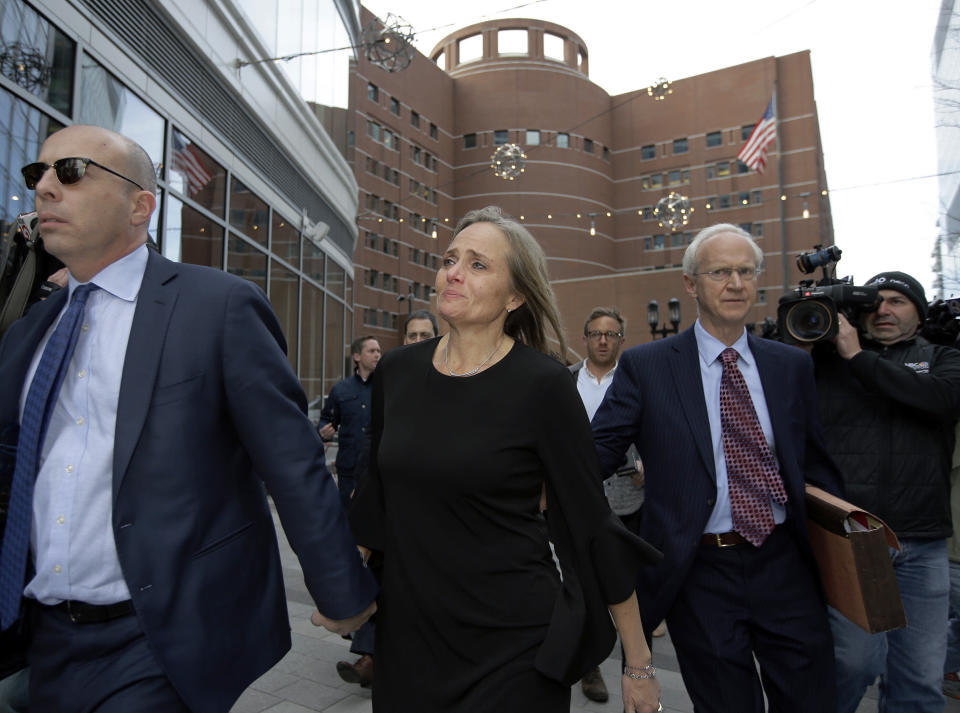Judge indicted for allegedly sneaking immigrant out of courthouse to thwart ICE
A Massachusetts District Court judge has been charged with obstruction of justice and suspended without pay for allegedly helping an undocumented immigrant avoid federal immigration agents by allowing him to sneak out the back entrance of the courthouse after a hearing last year.
The judge, Shelley Richmond Joseph, was indicted by a federal grand jury Thursday, along with Wesley MacGregor, who retired last month after 26 years as a Massachusetts Trial Court officer.
U.S. Attorney Andrew Lelling announced the indictment at a press conference alongside top officials from the U.S. Immigration and Customs Enforcement’s Boston field office.
“This case is not about immigration,” Lelling insisted. “It is about the rule of law.”
However, the apparently unprecedented action against Joseph, a sitting judge who was appointed in 2017 by Massachusetts Gov. Charlie Baker, a Republican, comes amid escalating tensions between federal immigration officials and state and local authorities who refuse to help carry out the Trump administration’s aggressive immigration policies.

The case revolves around Jose Medina-Perez, a Dominican national who was arrested by Newton, Mass., police in March of last year and charged with drug possession. According to court documents, Medina-Perez, who was believed to be the subject of an outstanding warrant on a drunk driving charge, had been deported twice previously. ICE requested police to hold him until he could be placed in their custody.
According to the U.S attorney, on April 2, 2018, when Medina-Perez appeared before Joseph for a hearing, a plainclothes ICE officer arrived to take him into custody. Joseph’s clerk told the ICE agent to wait in the lobby, where he would encounter Medina-Perez leaving the courtroom if the judge agreed to his release.
The indictment says that Joseph, the prosecutor and Medina-Perez had a brief sidebar about the immigration detainer, during which Joseph instructed the clerk to turn the courtroom recorder off for about a minute, a violation of the court rules.
The fugitive warrant was dropped when prosecutors discovered they had the wrong man and the judge determined he did not need to be held on the drug charge. Informed that an ICE agent was waiting outside, Joseph said “I’m not going to allow them to come in here.”
Then, according to the indictment, MacGregor escorted Medina-Perez downstairs and out a back door.
He was captured by ICE later that month, and has since been released on bond awaiting an immigration hearing, currently scheduled for July.

Joseph and MacGregor were indicted on one count of conspiracy to obstruct justice and two counts of obstruction of justice — aiding and abetting. MacGregor was also charged with one count of perjury. They pleaded not guilty.
Massachusetts Attorney General Maura Healey called the indictment “a radical and politically motivated attack on our state and the independence of our courts.”
“It is a bedrock principle of our constitutional system that federal prosecutors should not recklessly interfere with the operation of state courts and their administration of justice,” Healey said in a statement Thursday. “I am deeply disappointed by U.S. Attorney Andrew Lelling’s misuse of prosecutorial resources and the chilling effect his actions will have.”
Carol Rose, executive director of the ACLU of Massachusetts, echoed Healey’s view of the indictment as “an assault on justice in Massachusetts courts.”
“This decision seems to have little to do with the actual facts, and everything to do with enforcing the president’s anti-immigrant agenda,” Rose said in a statement. “In this case, like so many others across Massachusetts, an ICE officer staked out a state court and made it difficult for court officials to do their job, which is to ensure that people in state court have access to justice.”
Massachusetts is home to several so-called sanctuary cities, including Boston and Newton, which have enacted laws barring local police from helping ICE to enforce federal immigration law. Last year, the state’s Supreme Judicial Court ruled that police could not detain people based solely on immigration violations.
Sanctuary cities have been the subject of regular attacks by President Trump, who issued an executive order to block federal funding for such jurisdictions shortly after taking office. Attempts by the Justice Department under former Attorney General Jeff Sessions to carry out that order, however, have been repeatedly blocked by the courts. More recently, the Washington Post reported that White House officials have proposed transporting immigrants in ICE custody to sanctuary cities and releasing them onto the streets as an act of retaliation against elected officials who oppose Trump’s immigration policies.
While such high-profile, dramatic attempts to penalize sanctuary cities have come up against legal challenges, over the last three years, immigration officials have employed increasingly aggressive tactics including ramping up arrests at courthouses) to target immigrants in communities where local law enforcement is barred from cooperating.
The increased ICE presence at both civil and criminal courthouses around the country has raised concerns from immigration advocates as well as criminal justice experts.
“ICE’s reliance on immigration arrests in courthouses instills fear in clients and deters them from seeking justice in a court building,” read a letter sent by 68 former state and federal judges in December to then-acting ICE Director Ronald Vitiello. Vitiello departed the agency earlier this month after Trump withdrew his nomination for director from the Senate, citing a desire to go in a “tougher direction.”
Lelling, the Massachusetts U.S. attorney, insisted the action against the judge was an anomaly and not intended as an attack on the Massachusetts courts. But the indictment and the high-profile press conference seemed intended to send a signal of a crackdown on sanctuary policies.
“We have heard of other instances in which it is alleged that judges have done something to help people who are pursuant by ICE,” Lelling said at Thursday’s press conference. “I don’t think it’s the only time something like this has happened in Massachusetts.”
Read more from Yahoo News:



